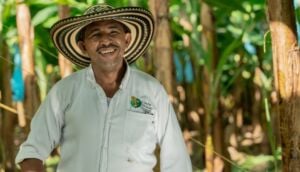What if executive coaching were made available to women early in their careers to increase and deepen their impact in the world?
Executive coaching is typically a privilege offered only to the most valued business professionals. After 20 years of working her way into the C-suite, Jane Finette’s employer offered her that opportunity. The experience fundamentally changed the way Finette saw the world and the role she would play as a leader.
Finette went on to launch The Coaching Fellowship (TCFS) to give young women leaders, especially those with the potential for broad social impact, access to very low-cost executive coaching and leadership development. This kind of coaching is inherently expensive and something young leaders do not normally have access to. In only six years TCFS has provided pro bono executive coaching and fellowship to more than 900 young female leaders from over 60 countries.
The Coaching Fellowship effected change by:
- Providing high-potential women leaders with one-to-one leadership coaching early in their careers.
- Creating a network of 900+ alumnae conducting monthly calls to discuss specific issues affecting women leaders.
- Delivering executive coaching programs to groups and organizations to support leaders throughout the course of their careers.
“I first limited the program to those who had already achieved outstanding success. Then I realized I was replicating the disconnect I had personally experienced in the corporate world. So we expanded our capacity to include more up-and-coming, high-potential young women, whether they’re a nonprofit in Detroit or an educator in Rwanda touching 150 people a month. They are the ones who are really benefiting from this unique experience, which focuses deeply on personal leadership development.
“Coaching is different from mentoring. Coaching is more short-term, focused on helping the person with specific goals. A coach rarely shares her experience or gives advice. Rather, she empowers the person to find their own answers, follow their instincts, and step into their leadership. This approach creates confidence and resilience.
“What distinguishes TCFS is that each fellow has access to six months (11 hours) of one-to-one sessions with their own coach for a completely customized experience tailored to where they need support or to grow. Our fellows are working on areas of their lives and careers they have never talked about or, in some cases, never even thought about. This inside-out work identifying their vulnerability is a game changer for them.
We have 150+ coaches in 30 countries. Using platforms like Zoom and Skype we can connect a fellow in Indonesia with a coach in India. This has allowed us to scale quickly in a cost-effective way.
“The Coaching Fellowship instills confidence in yourself and your skills through personal executive coaching, and then provides the alumnae network which supports you along your leadership path. My belief is that the sooner you are deeply aligned with who you are at your core, the more confidence you will have to make decisions based on your beliefs and goals.
“One of our fellows, Samantha Snabes, is a great example of the results you can see from the TCFS program. She is the co-founder of Re3d, a social-impact and open-source organization enabling and democratizing large-scale 3D printing. She worked with her coach on gaining confidence and establishing goals for funding her organization. She went on to win several pitch competitions and raised an additional $300,000 in the first six months after coaching.
“A surprising impact of coaching is that when you have had access to it, a certain part of you becomes a coach yourself. You show up differently with those around you, you ask different questions and see the world in a new way, thus inspiring many more people through the process of coaching.
“Our ultimate vision, and the reason we do what we do, is to co-create a world where visionary women are in leadership positions around the world, bringing about a new way of leading—based on the recognition of the interconnection of all human beings and the values of inclusion, compassion and generosity.”
Taking action on Finette’s experience
- To develop more female leaders, offer executive coaching to younger high-potential women in your organization, instead of only to those who have already achieved success.
- Recognize when your organization has specific issues at a team level, and offer executive coaching to the group, as a group.
- Whether it’s a peer network of all your marketing people, new college-graduate hires, or female managers, initiate and support peer networks that will improve your pipeline of leaders. Independent of coaching, remote peer networks are proving to be powerful problem- solving support.
- Instead of trying to fix a problem for someone, be a coach and help them fix the problem for themselves. That’s a much more powerful and long-lasting way to help.
Find more proven and practical advice to successfully navigate barriers and biases in business as well as society from these books: Women Forward: The 2020 Playbook and Mentoring Women Forward: The 2019 Playbook.










